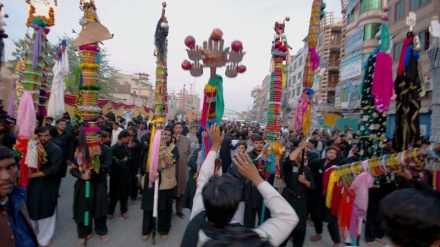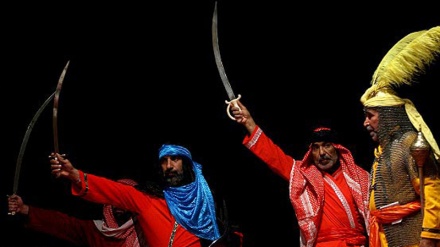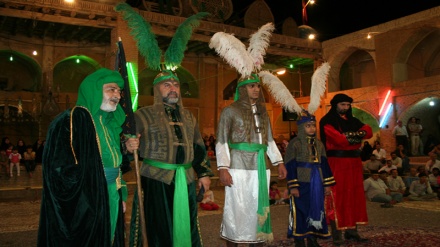Muharram mourning traditions in different lands - 7
Welcome to the 7th part of the 40-plus episodes of a new and interesting series titled “Muharram Mourning Traditions in Different Lands” that we started broadcasting as of October 15 on a daily basis, to commemorate the heartrending tragedy of Karbala, and the martyrdom of Imam Husain (AS), the grandson of Prophet Mohammad (SAWA).
In this series, which delves into the various mourning traditions associated with the Immortal Epic of Ashura in various lands, we look at the earliest history of mourning for Imam Husain (AS).
Today, we continue our discussion on how the mourning ceremonies for the Martyrs of Karbala took root in the Prophet’s city Medina, and from there spread to Mecca and the rest of Hejaz.
The Survivor of the Karbala Tragedy, Imam Zain al-Abedin (AS) and his son and successor, Imam Mohammad Baqer (AS), who as a 4-year old boy witnessed the heartrending scene of the brutal martyrdom of his grandfather Imam Husain (AS), greatly encouraged mourning ceremonies, which came to be known as “Aza al-Husain”. Meanwhile, in Kufa in Iraq, with the rise of the Tawwabin and Mokhtar ibn Abu Obaidah Thaqafi, to avenge the blood of Imam Husain (AS), lamentation and mourning ceremonies for the martyrs of Karbala spread in the Land of the Two Rivers. In Hejaz, however, such commemoration gatherings had to be performed in utmost secrecy as the Omayyad regime as well as Abdullah ibn Zubayr, who for ten years from 63 to 73 ruled as the rival caliph, were opposed to any remembrance of Karbala.
The poets who composed elegies and the devout people who attended the gatherings at which these elegies were recited did so at the risk of their lives. Nonetheless, the poets continued to pour out their emotions in their poetry. The event of Karbala had such a deep impact on the 4th Imam that tears used to continuously flow from his eyes. He used to remember the tribulations that befell his father Imam Husain (AS), his uncle Hazrat Abbas (AS), his brothers Ali Akbar (AS) and Ali Asghar (AS), his cousins Qassim (AS), Abdullah (AS), Aoun (AS) and Mohammad (AS), and other kinsmen and companions who were savagely martyred. Whenever water was presented to him tears would flow from his eyes and he would say: “How can I drink water when the (grand)son of the Prophet was slaughtered, thirsty.”
He would cry to such an extent that his beard would be soaked, and due to his wailing others would also cry.
Meanwhile in Iraq, these Majalis-e Aza touched and moved the people of Kufa and other areas so deeply that they gave rise to the movement of the Tawwabin or the Penitents, and subsequently the quest for avenging the blood of the Imam by Mokhtar ibn Abi Obaida Thaqafi, whose uprising attracted not just the people of Iraq, but also Iranians. It is also said that a group came to Kufa even from far off India to assist Mokhtar, who inflicted heavy defeats on the Omayyads and brought to justice most of the main culprits involved in the heinous crime against the Prophet's family, especially the chief ones, such Obaidollah ibn Ziyad, Khouli, Ibn Anas, Harmala, Shimr Ziljowshan, and last but not the least, Omar ibn Sa'd despite the fact that he was his sister's husband. Mokhtar was on the verge of wiping out the Omayyad dynasty, but for the treachery of the Abdullah ibn Zubayr. From Iraq, the mourning traditions spread to Iran and thence to the Indian subcontinent.
In Hijaz, Imam Mohammad Baqer (AS), spread the message of the Martyrs of Karbala in the cities of Medina and Mecca by holding mourning ceremonies. He would arrange a mourning congregation on the day of Ashura and wail over the calamities that befell the Chief of the Martyrs. In a particular Majlis, a poet named Kumait recited a poem in presence of the 5th Imam. When he recited the verse “And do not forget the one killed in the land of Iraq”, Imam Mohammed Baqer (AS) cried a lot and said: O Kumait! If I had the means, I would have rewarded you; but your reward is the Dua which the Prophet had sought for Hassaan bin Thabet on composing an ode in praise of Imam Ali ibn Abi Taleb (AS) following his formal proclamation as vicegerent on God’s commandment at Ghadir-Khom, saying: O Hassaan, as long as you defend the Ahl al-Bayt, divine support will be with you.
In his will, Imam Baqer (AS) set aside an amount of money for holding mourning ceremonies for ten years in Mena during the Hajj pilgrimage, so that pilgrims coming from different parts of the world become acquainted with the sufferings of the Prophet’s Ahl al-Bayt.
This task was continued by his son and successor, Imam, Ja'far Sadeq (AS), the great-grandson of the Martyr of Karbala, and the 6th Infallible Heir of Prophet Mohammad (SAWA). When the month of Muharram would come, smile would disappear from his face and effects of sorrow would appear, with tears flowing down his cheeks. On the eve and day of Ashura, his grief would be at its peak and he would continuously shed tears, saying: Today is the day when my great-grandfather, Imam Husain (AS) was martyred.
It is reported that once when a certain Fuzayl ibn Yaser came to pay his respects to the 6th Imam he asked after the usual exchange of courtesies: Do you people ever organise gatherings to commemorate the martyrdom of Imam Husain (AS)? Fuzayl, with tears pouring down his eyes, replied: O son of the Prophet of Allah, indeed we do. The Imam said: May Allah bless you. I highly approve of such gatherings.
On another occasion, the poet Ja'far ibn Iffaan recited to the 6th Imam an elegy on the tragedy of Karbala. The Imam began to weep uncontrollably, and then addressing the poet, said: Do not think that it is only those whom you can see here are listening to your poetry. In fact Allah's closest angels are present here at this Majlis-e Aza and they are all listening to your recitation and they too lament and weep. May Allah bless you for what you have recited! He will reward you with paradise for your efforts on our behalf.
Imam Ja’far Sadeq (AS) in a famous statement said: "Anyone (of the believers) who recites poetry about (Imam) Husain and cries and makes another one cry, Paradise will be written for both of them. Anyone (of the believers) in whose presence (Imam) Husain is mentioned, and tears come to his eyes even to the extent of a wing of a fly, his reward is with Allah, and Allah will not be pleased with anything less than Paradise for him.”
His son and successor Imam Musa Kazem (AS), the 7th Infallible Heir of the Prophet continued the tradition of the mourning ceremonies for Imam Husain (AS), during the repressive rule of the Abbasid dynasty. Each year on the advent of the month of Muharram, none would see him smile. This would continue till Ashura. On the Day of Ashura, his grief would reach its peak. He would be continuously crying and heard saying: This is the day on which (Imam) Husain (AS) had been killed.
MD/AS/SS


